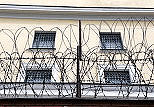Rights activists says torture still used in Russia

(Interfax – Moscow, 8 November) According to human rights activists, torture is still practiced in Russia and people complain of ill-treatment received at detention centres, police, army and mental hospitals.
“Human rights organizations have registered incidents of torture and ill-treatment in the prison system. They have also seen an increase in complaints in recent years. Tortures in remand centres are a systemic problem, which is primarily due to the fact that operatives who represent the investigation actively work there. This practice is widespread in all regions of Russia,” it says in an independent report by Russian human rights organizations, which has been sent to the UN Committee against Torture.
Excerpts from the report were received by Interfax from the Public Verdict foundation on Thursday (8 November).
On 8-12 November the UN Committee against Torture will study the situation with torture in Russia. Every four years, Russia has to report on measures taken to eradicate torture. Russia undertook these obligations in 1987, by ratifying the Convention against Torture and Other Cruel, Inhuman or Degrading Treatment or Punishment, according to the Memorial centre, which was one of the authors of the independent report.
“The ongoing police reform has not yet led to significant changes in police activities. The problem of torture was ignored during the reform of the Interior Ministry. Not a single purposeful innovative decision was made, which would have increased prevention of torture and given guarantees against it. The reform of the Prosecutor’s Office and the Investigations Committee has not yet led to better-quality investigations into allegations of torture,” the report says.
“In a vast majority of cases, reports of torture do not lead to criminal investigations or a full range of measures to investigate cases of torture. We must acknowledge that the current practice of processing reports of torture and ill-treatment is incompatible with the standards of an effective investigation. An analysis of cases being processed by human rights organizations shows that most often people complain of torture and ill-treatment by Interior Ministry employees,” the report says.
The human rights activists said that in 2011-2012 Russia had experienced a significant increase in protest activities. However, according to the activists, police, who are responsible for maintaining order during public events, often use violence against peaceful demonstrators, disproportionate to offences committed.
“As a rule, police use force indiscriminately, without considering the age, sex and physical condition of a person. Typically, police officers who use illegal methods to disperse rallies are not hold responsible, and none of the victims receive compensation for the injuries,” the document says.
“Impunity for torture is a systemic problem in the Russian armed forces. Russian human rights organizations continue to receive well-documented information about cases of torture, cruel, inhuman and degrading treatment or punishment in the armed forces,” the report says.
In addition, torture is used in mental health clinics.
“Psychiatric patients can complain about the quality of treatment and conditions to the authorities. But the management censor complaints and regard them as evidence of pathology. In practice the possibility to make a complaint while in hospital is severely restricted. A health service, independence from public health bodies, for the protection of the rights of patients, the creation of which is prescribed by the law “On psychiatric care and guarantees of citizens’ rights in its provision” has not yet been created,” the report says.
The alternative report was prepared by a coalition of human rights organizations, which includes Public Verdict foundation, Civil Assistance Committee, Memorial centre, Soldiers’ Mothers of St Petersburg, Independent Psychiatric Association of Russia, Committee against Torture and other organizations.
